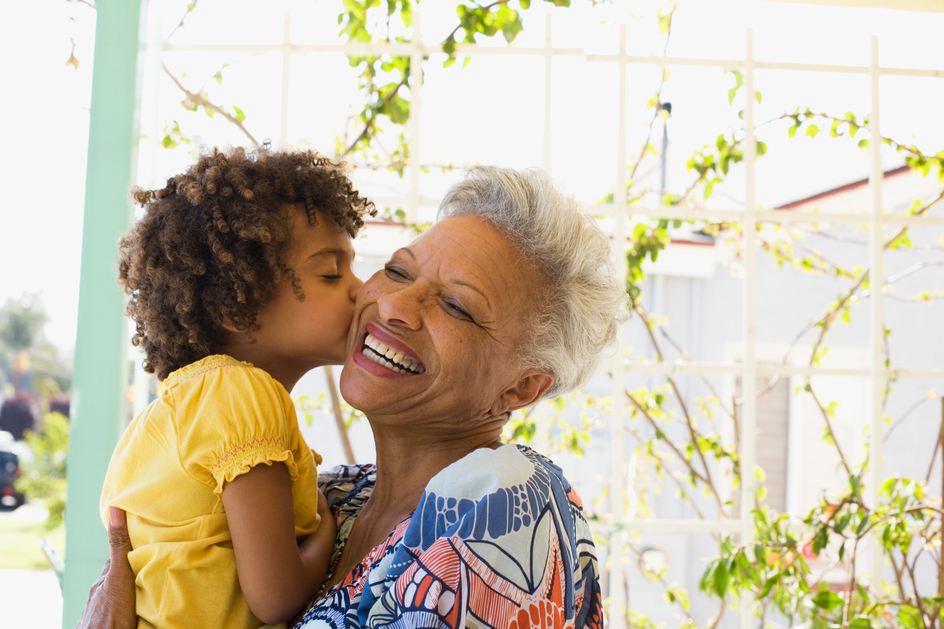
How do you explain to a grandchild what’s happening to a grandparent or another family member who is experiencing Alzheimer’s or dementia, especially when you’re having trouble processing the changes yourself? “Young people typically bring such joy to seniors, and seniors enjoy that good energy,” says Dr. Heather Palmer, a cognitive well-being specialist. “There are definitely benefits to both seniors and children to preserving that relationship.” Try these tips on helping young people understand dementia in a way that helps preserve the bond between generations.
Keep information simple
Whether the child is a mature four-year-old or an anxious teen, parents are the best judges of knowing what kind of information their child will be able to understand and handle. No matter what the child’s age, speak in simple terms. “Instead of talking about neuroplasticity,” says Dr. Palmer, “you can talk about Grandma’s brain changing.”
Explain in advance
Rather than dropping dementia into the conversation on the way to visit Grandma, prepare the child well in advance to give them time to think about the information and ask questions. You might say, “We’re going to be visiting Nana on the weekend, let’s not forget her brain works differently than it used to, and not exactly like yours or mine does.”
Be positive
You might be experiencing various emotions due to challenges related to your loved one’s dementia, but try to be positive when explaining age-related cognitive changes to children. You don’t want to scare the child, or have them think there’s something wrong. Instead, speak about the topic in a way that shows acceptance, says Palmer. For example, you might say, “Last time we saw Grandpa, we noticed his brain was working a little differently. Just like he doesn’t walk as fast as you do, his brain also doesn’t work as fast as it used to.”
Share practical tips
Every person experiences cognitive aging differently, but this advice is generally useful to share with family members of all ages:
- Speak slowly: “I might say, ‘When you’re speaking with Grandpa, you’ll want to talk a little more slowly to give him more time to think about what you’ve said,’” says Dr. Palmer.
- Be patient and accepting: Reassure children that they don’t need to jump in with answers if Grandma takes a long time to respond to questions or mixes up her words. If she doesn’t respond, it’s OK to ask again. If she repeats the same stories, Palmer suggests putting a positive spin on her forgetfulness. “I might say something like, ‘Maybe that’s happening because Grandma has so much information in her head from all the years she’s lived!’”
- Be OK with silence: Too much talking can seem like noise to someone with dementia. Instead of feeling the need to fill silences, let kids know Grandma gets great enjoyment from seeing her grandchild smiling or colouring or holding her hand.
Protect everyone's dignity
Emphasize to your child that Grandpa might say or do unusual things. Try to go along with it rather than correcting a senior who believes he’s 19 instead of 90. You could say, “Sometimes your grandfather says things that don’t seem to make sense to us but this is what he believes is true right now, and that’s OK for us to go along with it, too.”
Use visuals to communicate
Dr. Palmer remembers one of the most memorable visits she witnessed: seniors with dementia were totally engaged looking at science projects set up by a group of school children. Props that are visual and concrete can help bridge the communication gap. Ask your child to bring photos or pictures she’s drawn to help communicate.
Monitor your child's feelings
During the visit with Grandma or Grandpa, tune into your child so you can sense if they may be feeling uncomfortable. Before the visit, teach your children how to politely excuse themselves to use the bathroom or to signal to you (raise a finger, have a code word) that indicates they need a break.
Try to stay calm
People with cognitive challenges may have a hard time understanding their own emotions, so they may take on the feelings of people around them. If you become angry or frustrated with your dad for saying something harsh to your child, he’ll likely imitate you and become angry or frustrated as well. Using a calm voice, speaking slowly and smiling is more likely to help de-escalate the situation. Subtly separating your child from your parent in such situations may be best for everyone. Be sure to reassure your child that Grandpa didn’t mean what he said, and let them know you can talk about it more on the way home.
Whether there was a situation or not, it is always good to debrief after visits. You might ask your child: Did Grandma say anything funny? Anything that upset you? Did you have any questions? Palmer acknowledges that dementia affects people differently. Some become more loving and playful, some become more angry and impatient, and others go up and down. “But usually it’s a nurturing, mutual love that flows in both directions between children and grandparents.”
Find out how residents are enjoying great amenities, activities, flexible dining and personalized service at Amica residences. Book a personal visit today.
Dr. Heather Palmer is a cognitive well-being specialist with more than 30 years of clinical and scientific experience. She focuses on helping individuals improve the way they think, feel and function. She's developed cognitive well-being programs for Amica with a heightened focus on Memory Care and Assisted Living.
